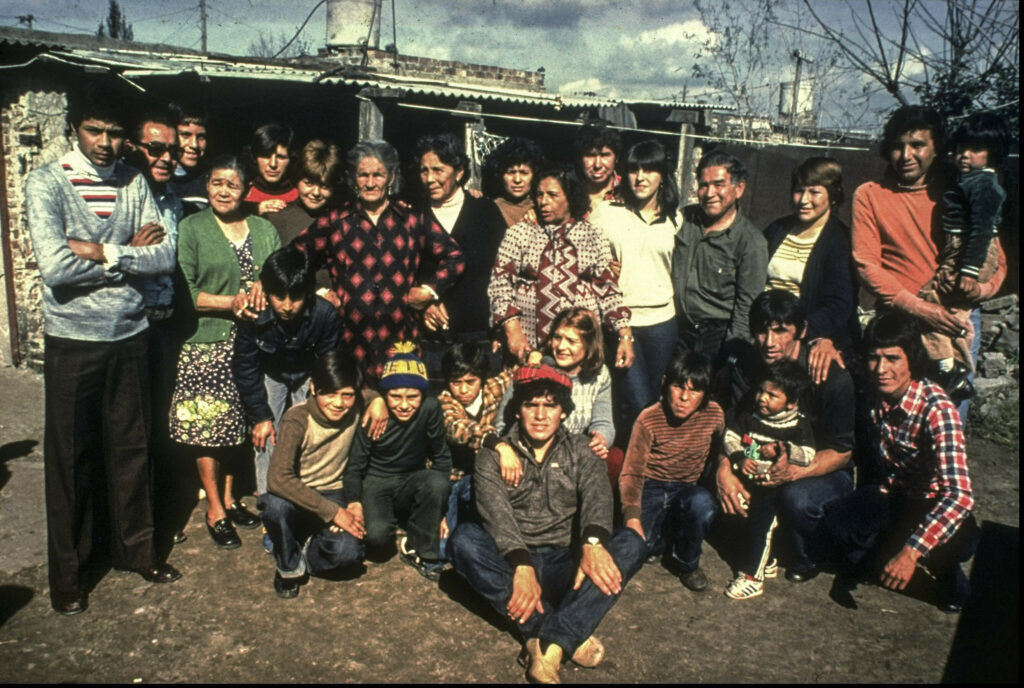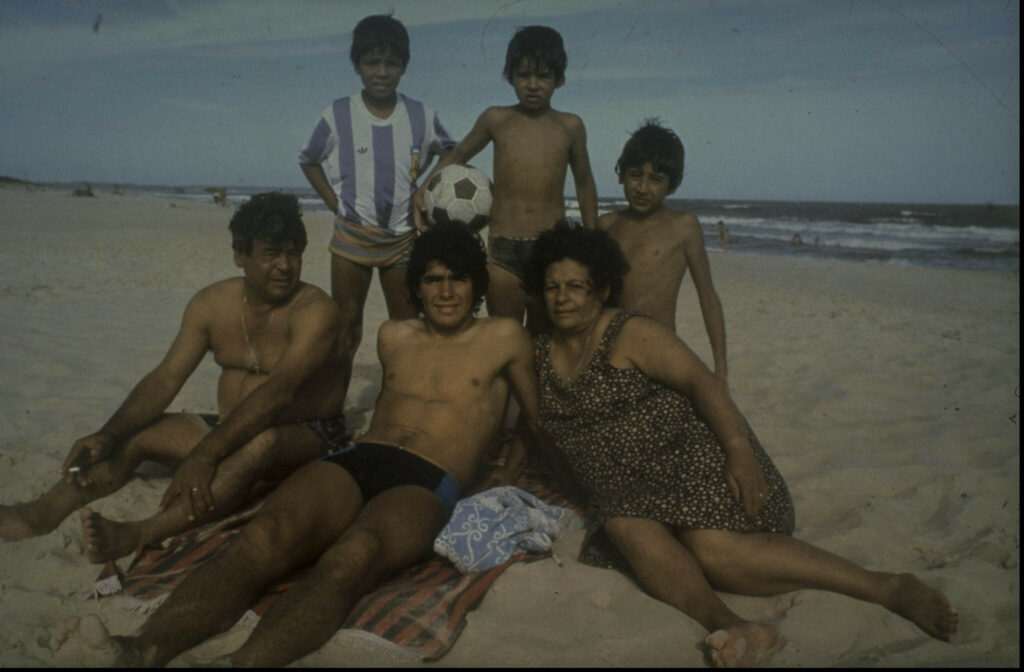Worldwide adoration, seen in this improvised altar (left) by the Fans of Argentinos Juniors football team, where he once played, was both his lifeline and his downfall. (Alejandro Pagni/AFP)
In the press conference room deep inside Cape Town’s Green Point Stadium, a suited-up and bearded Diego Maradona bristled with indignation at a footballing loss he found bereft of valour and honour.
The Argentina team he was managing had been knocked out of the quarterfinals of the 2010 World Cup in South Africa, losing 4-0 to Germany in a muddled and incoherent performance during which Maradona had been tactically outwitted by his opposite number, Joachim Löw. The game had left Maradona’s star player, Lionel Messi, stranded between the lines — isolated from both the midfield and his fellow attackers — and without a goal in the entire tournament.
Maradona appeared as if he had committed the ultimate national betrayal. As if he had smuggled himself behind enemy lines on Los Malvinas (the Falklands), a site of military contestation with the British in the 1980s, and given Argentina’s military plans to Margaret Thatcher’s army.
He was angry, on the verge of tears and confused: his pride would not settle on whether it was more honourable to resign, or carry on to fight another day and so redeem the honour of a proud footballing nation that he, more than any other — Perón included — had come to epitomise.
“I could walk away tomorrow, but I don’t know. I’m going to be 50 on 30 October, and this is the hardest thing I have had to go through since the day I retired from football. It was like a smack in the face from Muhammad Ali. I am drained of strength, but will I leave? I really don’t know. We will see what the future holds,” he told the assembled media.
Weeks later, the Argentina Football Association would make the decision for him and dumped the man who, more than any other player, had ensured the country won their second World Cup in Mexico in 1986.
But the torment that haunted Maradona in the minutes, hours and days after that defeat went to the very heart of a man who was forced to always “rise above the shit” in the lives of those around him, his own life… and the shit inside him.
Maradona was born into shit. Born in Buenos Aires, Maradona grew up on the city’s margins, in a three-bedroom shack in Villa Fiorito, a shanty town with a reputation for violence and squalor.
 Everybody wants a piece: An undated photo shows the young Diego front and centre, surrounded by family and friends in Argentina. Photo: Allsport UK /Allsport
Everybody wants a piece: An undated photo shows the young Diego front and centre, surrounded by family and friends in Argentina. Photo: Allsport UK /Allsport
He rose above the shit to fulfil a talent that combined the trickery of the footballing street urchin with the terrifying speed of an Olympic sprinter and breathtaking vision of a grandmaster.
From Argentinos Juniors to Boca Juniors to Barcelona for a then world-record fee for a footballer, Maradona rose quickly. He scaled his greatest heights at Italian club Napoli, which he joined in 1984 for another world record-setting fee.
Upturning the hegemony of the rich clubs from Northern Italy, a Maradona-led Napoli won the only two scudettos (league titles) in the club’s history, along with the Uefa Cup, the Italian Super Cup and the Coppa Italia. These were victories that affirmed a region long derided as a place of disease and poverty by the rest of Italy.
But shit always clings to you. Despite fame’s garlands and the perfume afforded by millions of dollars.
The claustrophobia of fame, as his unofficial biographer Jimmy Burns noted in the essay Dying with Maradona, engendered “a suffocating sense of entrapment, of dreadful darkness, of inability to escape, like when, as a child, he falls into an open sewer of the shanty town and starts drowning in the communal shit before being rescued by his Uncle Cirilo”.
Cirilo would save his nephew a second time when presenting him with a leather football for his third birthday. It was a gift that proved both freedom and shackle.
The deep contradictions that make us human were never more viscerally personified than in Diego Armando Maradona.
There was the dark side: the gargantuan appetite for cocaine, pizza, prostitutes, the association with the Camorra, the Neapolitan mafia, and any kind of excess and hard living.
There was the illuminated side: the football of the Gods, the left-wing politics that saw him embrace the policies of Cuba’s Fidel Castro and Venezuela’s Hugo Chavez, and his open criticism of authority, from Fifa to the Catholic Church.
 aradona is challenged by England player Terry Fenwick as Kenny Sansom (l) looks on during the FIFA 1986 World Cup quarter-finals defeat by Argentina in the Azteca stadium on June 22, 1986 in Mexico City, Mexico. (Photo by Allsport/Getty Images/Hulton Archive)
aradona is challenged by England player Terry Fenwick as Kenny Sansom (l) looks on during the FIFA 1986 World Cup quarter-finals defeat by Argentina in the Azteca stadium on June 22, 1986 in Mexico City, Mexico. (Photo by Allsport/Getty Images/Hulton Archive)
Then there were the goals. The brilliant ones, the dastardly ones, the ones that took the breath away and the ones which made you believe in something, anything, other than this material world.
Nothing demonstrated the inner workings of Maradona the foot- baller, and Maradona the human being, more than the brace he scored against England at the Estadio Azteca during a 2-0 victory in the 1986 World Cup quarter-finals.The first was a goal scored with the hand — what Maradona would later describe as “the hand of God”, in what he referenced as some divine justice being meted out to a country that had, during the battle for Los Malvinas, bullied Argentina and murdered its young sons.
A goal of cunning and trickery, of the foul means learnt in the no-holds-barred furnace of the potreros of Villa Fiorito, the tenement yards of Glasgow and the township streets of Soweto.
Four minutes later, Maradona collected the ball around the halfway line before twisting and turning, feinting and dribbling, ghosting past and bedevilling five English defenders before going around England goalkeeper Peter Shilton and sticking the ball in the back of the net.
There is a “slanderous generalisation” that for the Argentinian macho, foul means are more satisfying than fair ones, which Martin Amis explores through these two goals in his essay In Search of Dieguito. Argentinians, Amis argued, much preferred the Hand of God goal to Maradona’s more aesthetic and perfumed second goal.
“The second goal against England was a languid, erotic epiphany; the first was a knee-trembler in a back-alley; and each has its points. More broadly, there is in this culture a humiliation, an abjectness, in always playing by the rules,” Amis wrote in an attempt to get to the “key to the character of the Argentinians”.
 1970: A young Diego Maradona (centre) of Argentina relaxing with his family on a beach. (Mandatory Credit: Allsport UK/Allsport)
1970: A young Diego Maradona (centre) of Argentina relaxing with his family on a beach. (Mandatory Credit: Allsport UK/Allsport)
Maradona rarely played by the rules: of football, of gravity, of the law, of what one human could possibly do with a football. Often, he made his own rules.
In Soccer in Sun and Shadow, the Uruguayan writer Eduardo Galeano best described the otherworldly nature of being Diego Armando Maradona: “It was not easy to forget that for many years Maradona committed the sin of being the best, the crime of speaking out about things that the powerful wanted kept quiet, and the felony of playing left-handed, which according to the Oxford English Dictionary means not only ‘of or pertaining to the left hand’ but also sinister or questionable…
“He was overwhelmed by his own personality. Ever since that day long ago when fans first chanted his name, his spinal column caused him grief. Maradona carried a burden named Maradona that bent his back out of shape… It did not take him long to realise it was impossible to live with the responsibility of being a God on the field, but from the beginning he knew that stopping was out of the question.
 Defying rules: Maradona (above) took on the Belgian defence during the 1982 Fifa World Cup match. (Photo by Steve Powell/Allsport/Getty Images)
Defying rules: Maradona (above) took on the Belgian defence during the 1982 Fifa World Cup match. (Photo by Steve Powell/Allsport/Getty Images)
“‘I need them to need me,’ he confessed after many years of living under the tyrannical halo of superhuman performance. Swollen with cortisone and analgesics and praise, harassed by the demands of his devotees and by the hatred of those he offended.”
Diego Maradona reminded us that humans exist in the battle between dark and light. That despite the fragrance of springtime flowers, of expensive perfume, we should never use them to cloak the stench of the shit that always remains around us.
Diego Armando Maradona.
Footballer.
30 October 1960 — 25 November 2020